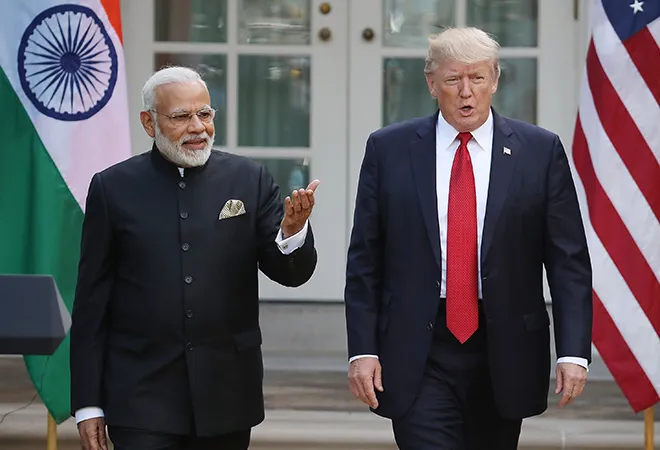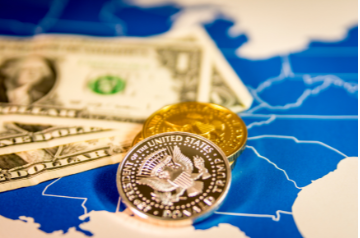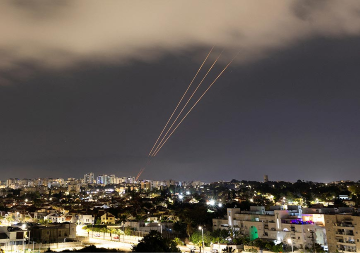Prime Minister Narendra Modi’s six-day visit to the US (September 21-27) is likely to be an important marker in Indo-US ties. Bilateral ties between the world’s oldest and largest democracies have been burgeoning but a section of the Indian commentariat has remained consumed by minor irritants. President Donald Trump’s back-and-forth on Kashmir was analysed and over-analysed to see if there has been a shift in the American position on the issue. Trade disputes were elevated to a point where they seemed to be on the verge of derailing the entire edifice of Indo-US ties. The reality, however, has always been quite different. US-India relations have blossomed under Trump and Modi’s substantive outreach to him has clearly paid dividends.
Prime Minister Modi and President Trump will be meeting twice in less than a week and Trump will join Modi in addressing the mega “Howdy Modi” rally to be attended by more than 50,000 Indian-Americans in Houston, Texas. This is expected to be one of the largest-ever events to welcome a foreign head of government in the history of the US. In Houston, Modi will be participating in a round table meeting with the chief executive officers of energy companies. Energy will be an important driver of Indo-US ties in the coming years and Indo-US engagement on this issue will be reinforced by Modi’s outreach. India is working towards increasing imports from the US with a particular focus on oil.
At the United Nations (UN), Modi will attend the UN climate meeting, apart from addressing a session on terrorism at the UN headquarters. He will deliver a special address at the UN General Assembly, but there are other events as well, especially the commemoration of the 150th birth anniversary of Mahatma Gandhi, which will see the participation of several global leaders. Modi’s visit to the UN General Assembly comes against the backdrop of New Delhi’s decision to abrogate Article 370 in Jammu and Kashmir. While India has found support in major world capitals and Pakistan’s isolation is complete, Modi's visit to the UN General Assembly would allow New Delhi to make its case to the wider international community more substantively.
Pakistan has tried to raise the bogey of nuclear weapons and created an impression of an impending conflict with India, but has failed to galvanise global opinion in its favour. Apart from China, no major country has come to Pakistan’s support. Trump’s off-the-cuff remarks on Kashmir, where he seemingly invited India and Pakistan to consider his offer of mediation, was deemed a great victory by Islamabad, but soon it realised that there was no substance in it. In the presence of Trump at their meeting in Biarritz, France, on the margins of the G-7 summit, Modi categorically rejected any scope for third party mediation between India and Pakistan on Kashmir, saying the two countries can discuss and resolve all issues bilaterally, and “we don’t want to trouble any third country.”
India’s outreach at the UN General Assembly this year has been described as “unprecedented” by India’s Permanent Representative to the UN, Ambassador Syed Akbaruddin, with a total of over 75 heads of State and foreign ministers meeting with Modi, External Affairs Minister S Jaishankar and Minister of State for External Affairs V Muraleedharan during the week, across various platforms. More importantly, Modi’s regular presence at the UN General Assembly special sessions is in line with his desire to project India’s leadership credentials on the global stage. An India that wants to be a rule shaper, not merely a rule taker, should have a proactive approach to global governance. Modi’s speeches, which tend to ignore Pakistan and touch upon key global issues facing the international community, position India effectively as a global interlocutor.
At the bilateral Indo-US level, Modi is trying to shrewdly demonstrate the potency of the Indian diaspora with his mega outreach event in Houston. He hopes to leverage this soft power of India in his dealings with Trump. Trump’s presence at the event is an acknowledgement of this reality. A likely announcement on trade is on the cards. Both sides have been working on resolving trade issues.
The Trump Administration terminated India’s designation as a beneficiary developing nation under the key GSP trade programme in June this year, after determining that New Delhi has not assured the US that it will provide “equitable and reasonable access” to its markets. India imposed retaliatory tariffs on 28 US products — including almonds and apples — a year after announcing them, to counter the increase in steel and aluminium tariffs by the US and withdrawal of duty-free benefits to Indian exporters. But the two nations have engaged with each other throughout this challenging phase.
New Delhi also remains cognizant of the fact that it could benefit significantly from the ongoing US-China dispute if it takes appropriate policy measures. So, it would be important for Modi to sell India as an investment destination to US investors, who would be keen to hear the Indian prime minister at a time when the global economy is slowing down. A number of measures announced by Finance Minister Nirmala Sitharaman are aimed at reassuring the investor community that India remains open for business. And Modi would be conveying a similar message to American investors.
But what this visit of Modi to the US would underscore once again is that Indo-US ties remain robust and, in the words of India’s ambassador to the US Harsh Vardhan Shringla, the India-US strategic relationship has the potential to become the “defining partnership” within this century. Given how far this relationship has travelled in the last few years, this clearly doesn’t seem like an exaggeration.
This commentary originally appeared in The Business Standard
The views expressed above belong to the author(s). ORF research and analyses now available on Telegram! Click here to access our curated content — blogs, longforms and interviews.




 PREV
PREV


